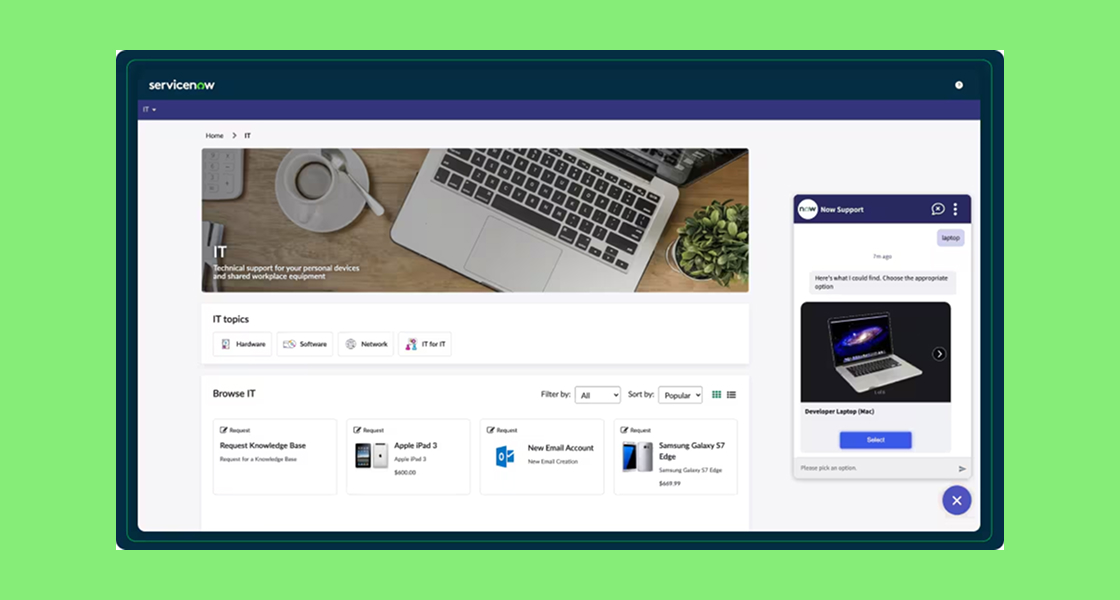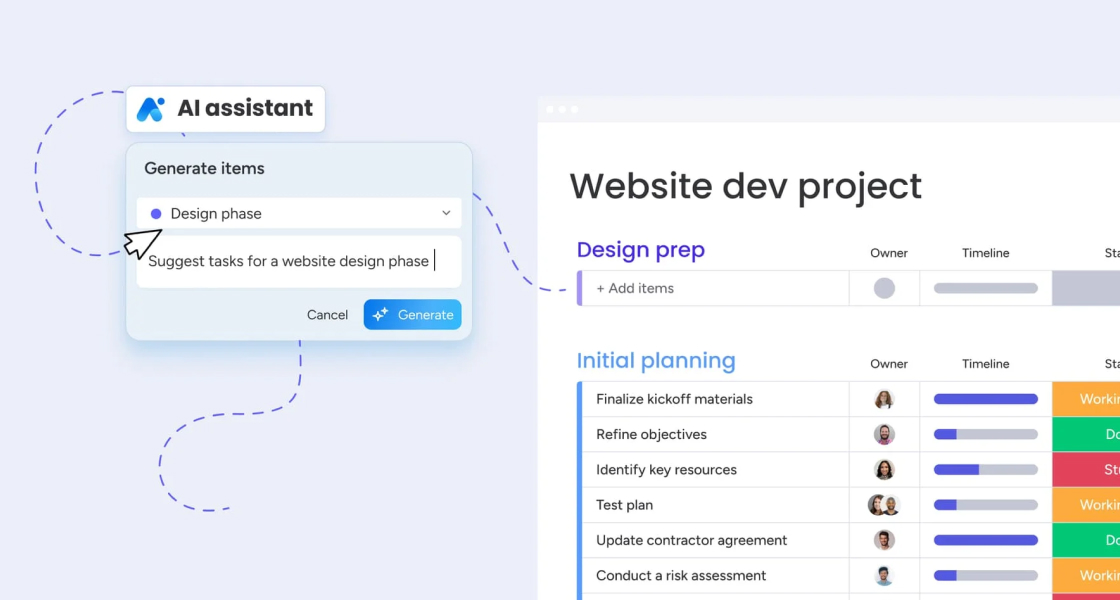Automation of approvals in ITSM: How AI optimizes workflows and decision-making

IT Service Management (ITSM) is much more than just an operational area, it’s the backbone that keeps companies running with efficiency, security, and agility. Yet among its many challenges, one of the most common, and also most costly, remains the management of routine approvals. Software requests, user access, or internal purchases often turn into bottlenecks that waste time, slow down processes, and expose organizations to compliance risks.
Today, Artificial Intelligence (AI) is changing that reality. By integrating AI-powered approval processes into ITSM, companies are transforming how requests are submitted, processed, and completed. What was once a manual and repetitive procedure is now becoming a streamlined, efficient workflow with a direct impact on productivity and return on investment.
In this article, we’ll explore the trends, tools, and real-world use cases that show how intelligent automation reduces bottlenecks, ensures compliance, and frees IT teams to focus on higher-value strategic initiatives.
The Challenges of Manual Approval Workflows in ITSM
Despite rapid digital transformations, many organizations still rely on manual, or partially automated, approval chains for common IT requests. These outdated processes lead to a cascade of inefficiencies:
- Delays and Bottlenecks: Approvers may be unavailable, unaware of pending requests, or overwhelmed by volume, resulting in backlogs.
- Inconsistent Decisions: Human approvers are subject to interpretation and fatigue, which can create variability and a lack of audit trail.
- Compliance Risks: Manual errors or missed steps can inadvertently violate policies, especially with sensitive data or privileged access.
- IT Staff Burnout: Valuable hours are consumed by repetitive approvals instead of strategic ITSM improvements.
- User Frustration: Employees waiting for software, access, or resources may experience needless downtime, affecting business outcomes.
These challenges present compelling reasons for organizations to re-examine how they approach approvals, especially as demands for speed and compliance grow.
What Are AI-Powered Approval Workflows?
An AI approval workflow leverages artificial intelligence and workflow automation to streamline and accelerate decision-making within ITSM environments. Instead of relying exclusively on human intervention, AI-powered engines analyze contextual data, such as requester profiles, historical patterns, organizational policies, and risk factors, to make or recommend approval decisions instantly.
These workflows can be:
- Fully automated (AI makes and logs the decision based on set criteria and dynamic learning)
- Semi-automated (AI recommends an action, escalating only exceptions or edge cases to human approvers)
- Rule-based with AI augmentation (Traditional rules are enhanced with AI models that detect anomalies or optimize routing)
The result? Routine requests are processed at lightning speed with fewer errors and greater consistency, while IT staff can focus on escalations, improvements, and strategic projects.
Key Use Cases for Automating Approvals in ITSM
The possibilities for automated decision-making in ITSM are vast. Let’s explore some of the most impactful and commonly implemented use cases:
- When an employee requests access to a SaaS tool or licensed application, AI can validate eligibility, business need, and license availability, granting approvals in seconds or routing exceptions for further review.
- Automate workflows on onboarding and offboarding, cross-referencing roles, departments, and compliance requirements to prevent unauthorized access or privileges.
- AI can assess low-risk changes (such as routine patching) for auto-approval, freeing up Change Advisory Boards for higher-risk scenarios.
- Automate approvals for standard hardware, software, or cloud services within pre-defined policies, avoiding needless human intervention for routine and compliant asks.
- AI can check budgets, project codes, and approval hierarchies, ensuring rapid but policy-aligned decision-making.
Across these scenarios, AI approval workflow automation translates to tangible business outcomes: faster service delivery, stronger compliance, and improved employee experiences.
How AI-Driven ITSM Automation Delivers Value
Integrating AI-powered approval workflows within ITSM doesn’t just accelerate processes, it creates lasting, strategic value:
- Reduced Cycle Times: Approvals that once took hours or days are executed in minutes or even seconds, shrinking service request backlogs.
- Enhanced Compliance: Every AI-driven approval is logged, auditable, and checked against current policy, drastically reducing human error and regulatory risk.
- Consistent Decisions: AI models promote standardization, making decisions based on data-driven rules and patterns rather than subjective judgment.
- Staff Efficiency: Routine, high-volume approvals are offloaded from IT managers and staff, allowing them to focus on innovation, security posture, and business partnership.
- Employee Satisfaction: Fast, predictable service boosts end-user confidence and productivity.
Ultimately, automated decision-making in ITSM is a process optimization lever that scales with your organization, helping you deliver more with less and position IT as a true enabler of business success.
Illustrative Example: Automating Software Provisioning in ITSM
To bring the power of ITSM automation to life, consider the following example of software provisioning with AI-driven approvals.
- An employee submits a request for Adobe Creative Cloud via the ITSM self-service portal.
- AI checks the employee’s role, project code, and department against policy (e.g., only Marketing and Design teams are authorized).
- The system verifies if licenses are available and if purchase aligns with department budgets.
- AI reviews prior usage patterns (are similar requests common for this role? Any recent exceptions?) and searches for potential conflicts or violations.
- If criteria are met, AI auto-approves and triggers license provisioning, all logged for audit. If not, it escalates to a human approver with a summary of findings.
With workflow automation, IT regains hours otherwise lost to manual review, and employees receive the tools they need, when they need them.
Best Practices for Implementing AI Approval Workflows in ITSM
Launching a successful AI approval workflow program requires thoughtful design, stakeholder engagement, and attention to governance:
- Target routine, well-defined approvals as initial automation candidates to build confidence and show quick wins.
- Collaborate on policy updates, exception handling, and clear escalation paths for outliers.
- Provide visibility into how AI makes or recommends decisions, and ensure easy access to audit logs.
- Monitor model performance, false positives/negatives, and user feedback. Continuously tune workflows and AI algorithms.
Adhering to these principles will ensure your ITSM automation journey improves both efficiency and stakeholder trust.
Potential Pitfalls and How to Avoid Them
While the promise of automated decision-making is compelling, pitfalls can arise if not carefully managed:
- Avoid the trap of “set it and forget it.” Not every approval can be automated; exceptions and evolving policies require ongoing review.
- AI models trained on insufficient or biased data may reinforce bad habits or miss subtle risk indicators. Feed your algorithms high-quality historical data.
- Ensure your automation engine reflects all regulatory obligations, e.g., GDPR, SOX, HIPAA — particularly for access and data handling.
- Routine approvals can be automated, but don’t neglect edge cases where human judgment is needed for nuance or stakeholder buy-in.
- Keep users and IT staff informed about changes to approval workflows to prevent confusion and build support.
Successful AI approval workflow implementation hinges on a balanced approach, maximizing automation while maintaining necessary oversight and adaptability.
The Future of AI-Powered Approvals: What’s Next?
The arc of ITSM workflow automation is still rising. As AI models become more sophisticated and federated with enterprise data, expect several emerging trends:
- AI predicts and initiates needed approvals before they're even requested (e.g., based on role changes or upcoming projects).
- Dynamic decisions that factor in time, location, behavioral analytics, and real-time risk signals for 'just-in-time' access.
- Seamless orchestration of approvals across SaaS, IaaS, on-premises, and edge environments.
- Approval metrics and workflow telemetry guide continuous optimization and help IT organizations demonstrate ROI.
- Employees interact with chatbots or voice assistants to request and receive approvals, with AI handling routine processing on the backend.
These advancements are poised to make ITSM productivity a competitive advantage, delivering not only faster approvals but also more resilient and adaptive IT operations.
Elevating ITSM Productivity with AI-Powered Approval Workflows
The days of manual, error-prone approval chains in ITSM are numbered. By embracing AI-driven workflow automation and intelligent decision-making, organizations unlock new levels of process optimization, compliance, and service excellence.
From software requests and user provisioning to change management and resource allocation, accelerating routine approvals empowers IT teams to deliver with agility and governance. Staff are freed to focus on higher-value work, requests flow without bottlenecks, and your business is prepared for the digital challenges ahead.
Ready to take the next step in optimizing your processes? Contact us to discover how modern AI-powered ITSM platforms can transform your organization.















